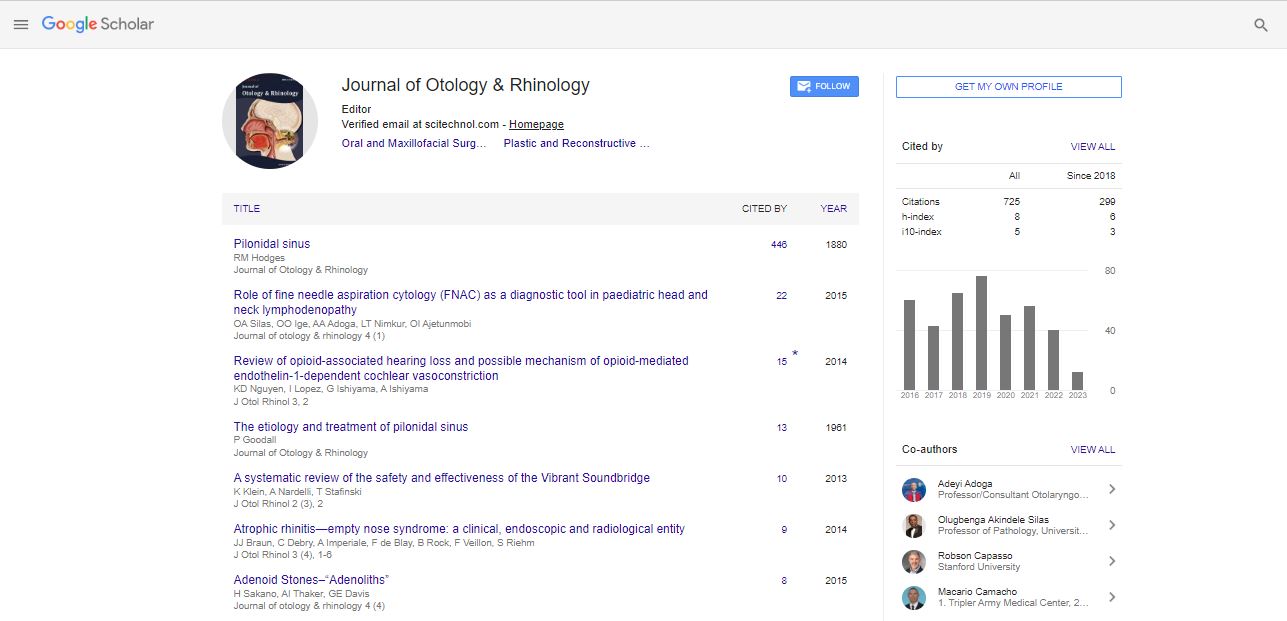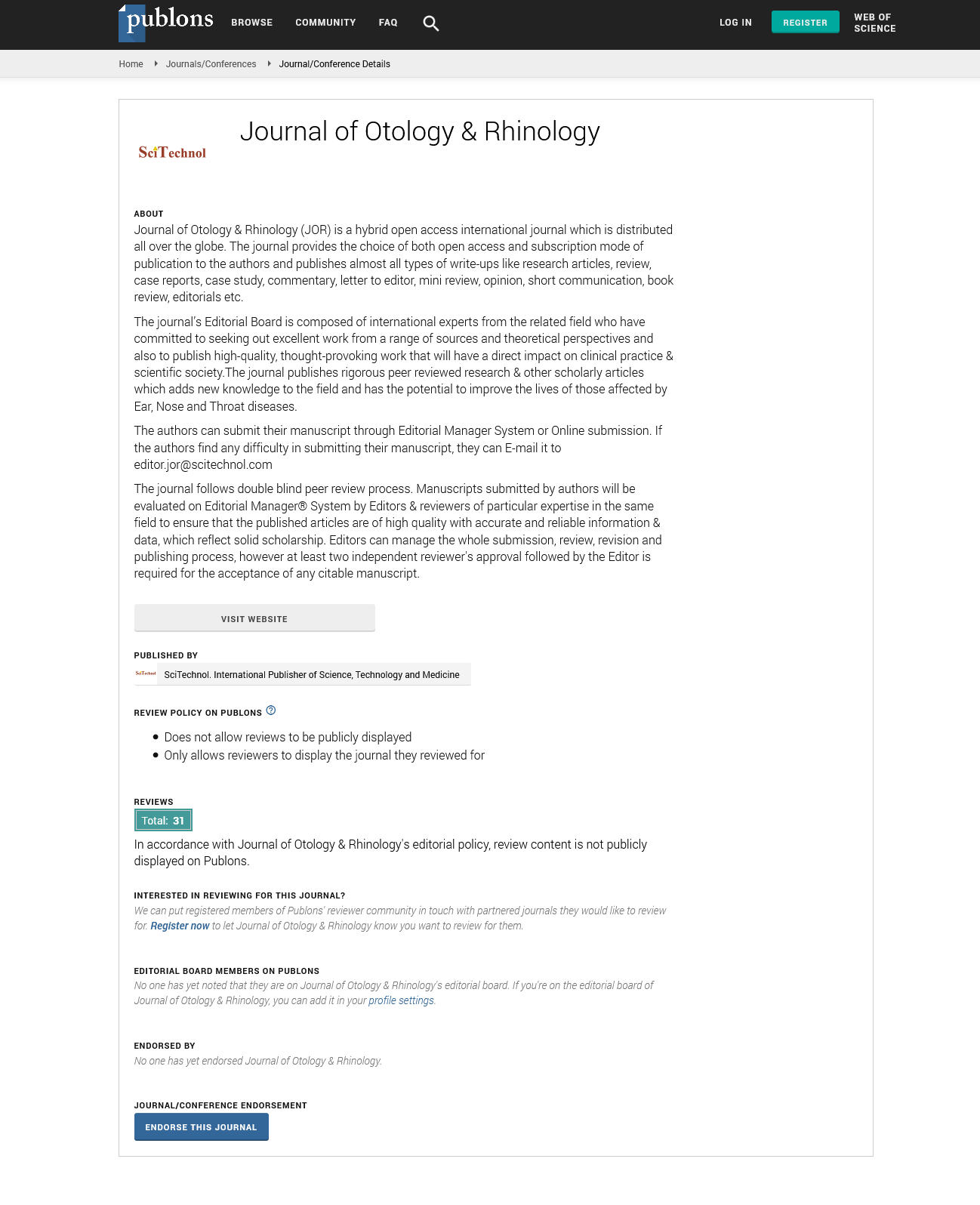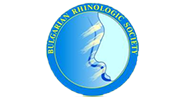Review Article, J Otol Rhinol Vol: 4 Issue: 5
Rhinotopic Therapy for Refractory Rhinosinusitis: Clinical Effectiveness and Impact on the Epithelial Membrane and Mucosal Biofilms
| Alan H Shikani1*, Mary Ann Jabra-Rizk2, Henry J Shikani3,4, Randall J Basaraba5 and Jeff G Leid6 | |
| 1Maryland Nose and Sinus Center, Division of Rhinology, Department of Otolaryngology-Head and Neck Surgery, Union Memorial Hospital and Sinai Hospital, Baltimore, USA | |
| 2Department of Oncology and Diagnostic Sciences, Dental School, Department of Pathology, School of Medicine, University of Maryland, Baltimore, USA | |
| 3Department of Pathology, Sue Golding Graduate Division, Albert Einstein College of Medicine, Bronx, NY, USA | |
| 4Department of Molecular Microbiology and Immunology, Johns Hopkins Bloomberg School of Public Health, Baltimore, MD, USA | |
| 5Department of Microbiology Immunology and Pathology, Colorado State University, Fort Collins, CO, USA | |
| 6Center for Microbial Genetics and Genomics, Northern Arizona University; Flagstaff, AZ, USA | |
| Corresponding author : Alan H. Shikani, MD FACS, Director, Division of Rhinology and Chief, Otolaryngology-Head and Neck Surgery, Sinai Hospital and Union Memorial Hospital, 201 East University Parkway, Baltimore, MD, USA, 21218, Tel: 410-554-4455; Fax: 410-554 2171 E-mail: ashikani@aol.com |
|
| Received: August 18, 2015 Accepted: October 24, 2015 Published: September 10, 2015 | |
| Citation: Shikani AH, Jabra-Rizk MA, Shikani HJ, Basaraba RJ, Leid JG (2015) Rhinotopic Therapy for Refractory Rhinosinusitis: Clinical Effectiveness and Impact on the Epithelial Membrane and Mucosal Biofilms. J Otol Rhinol 4:5. doi:10.4172/2324-8785.1000249 |
Abstract
Objective: To evaluate the clinical effectiveness of rhinotopic therapy, and its impact on the mucosal membrane and mucosal biofilms of patients with refractory chronic rhinosinusitis (CRS).
Study design: Prospective pilot clinical study.
Setting: Tertiary rhinology referral center.
Subjects and methods: Twenty-three patients with refractory CRS were treated with the rhinotopic protocol, a multimodality therapy consisting of topical sinus application of antibiotics and corticosteroids through gel and nebulization, endoscopic sinus debridement and saline irrigation. Clinical outcome was assessed using Lund-Kennedy (LK) symptom and endoscopic appearance scores. Mucosal epithelial barrier changes were evaluated through H & E stain. The impact on biofilms was assessed through colony forming units (CFUs) counts.
Results: Following treatment, there was a significant improvement in the patients’ LK symptom and endoscopic appearance scores, in the mucosal epithelial barrier and in the biofilms CFUs count. The clinical improvement was sustained at least 6 months following completion of therapy.
Conclusion: Refractory CRS is a difficult to treat entity that does not respond to traditional medical therapy, including repeated oral antibiotics, commercial nasal steroids, nasal saline rinses and sinus debridement. This work shows that rhinotopic therapy is effective in improving clinical symptoms, healing mucosal damage and disrupting biofilm load in refractory CRS patients. Further work is needed to investigate if single aspects or a collective implementation of the different components of this therapy are responsible for improvement.
 Spanish
Spanish  Chinese
Chinese  Russian
Russian  German
German  French
French  Japanese
Japanese  Portuguese
Portuguese  Hindi
Hindi 


